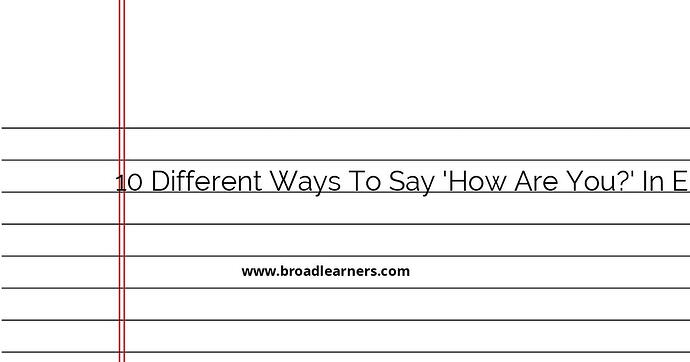When you greet someone, it's common to ask 'How are you?' as a polite way of showing interest in their well-being. However, using the same phrase every time can become repetitive and monotonous. If you want to expand your vocabulary and make your greetings more engaging, here are 10 different ways to say 'How are you?' in English:
- How's it going?
- What's up?
- How have you been?
- How do you do?
- How are you doing?
- How's everything?
- How are things?
- How are you holding up?
- How's your day going?
- What's happening?
Let's explore each alternative in more detail:
1. How's it going?
This is a casual and friendly way to ask someone about their well-being. It's commonly used in informal conversations and among friends or acquaintances.
Example:
Person A: Hey, how's it going?
Person B: Not bad, thanks! How about you?
2. What's up?
This is an informal and relaxed way to greet someone and ask about their current state. It's commonly used among friends and colleagues in casual settings.
Example:
Person A: Hey, what's up?
Person B: Nothing much, just enjoying the weekend. How about you?
3. How have you been?
This phrase is used to inquire about someone's well-being and ask about their recent experiences. It's a more personal and sincere way to show interest in their life.
Example:
Person A: Long time no see! How have you been?
Person B: I've been good, thanks for asking. How about you?
4. How do you do?
This is a formal and traditional way to greet someone. It's often used in formal introductions or when meeting someone for the first time.
Example:
Person A: How do you do? I'm John, nice to meet you.
Person B: Hello, I'm Sarah. Pleasure to meet you too.
5. How are you doing?
This is a slightly more detailed version of 'How are you?' It implies a genuine interest in the person's well-being and gives them the opportunity to share more about their current situation.
Example:
Person A: How are you doing these days?
Person B: I'm doing well, thanks for asking. I've been keeping busy with work and family.
6. How's everything?
This question is broader and includes not only the person's well-being but also their overall life situation. It's a friendly and caring way to ask about their general state.
Example:
Person A: How's everything going with you?
Person B: Everything's going well, thank you. I've been enjoying my new job and spending time with loved ones.
7. How are things?
Similar to 'How's everything?', this question asks about the person's general situation and well-being. It's commonly used in both formal and informal contexts.
Example:
Person A: I haven't seen you in a while. How are things?
Person B: Things are going great, thanks for asking. I recently started a new hobby and it's been a lot of fun.
8. How are you holding up?
This phrase is often used to show concern and ask how someone is coping with a challenging situation or difficult circumstances. It's a more empathetic way to ask about their well-being.
Example:
Person A: I heard about what happened. How are you holding up?
Person B: It's been tough, but I'm taking it one day at a time. Your support means a lot.
9. How's your day going?
This question focuses specifically on the person's day and what they have been experiencing. It's a more specific and detailed way to ask about their well-being.
Example:
Person A: Hi there! How's your day going so far?
Person B: It's been a good day. I had a productive morning at work and now I'm looking forward to some downtime.
10. What's happening?
This is a casual and informal way to greet someone and ask about what they have been up to. It's commonly used among friends and colleagues in relaxed settings.
Example:
Person A: Hey, what's happening?
Person B: Not much, just catching up on some TV shows. How about you?
Now you have a variety of alternatives to choose from when greeting someone and asking about their well-being. Remember to consider the context and relationship with the person to use the most appropriate phrase. Keep practicing and expanding your vocabulary to make your conversations more engaging!
Did I miss anything? Respond below
